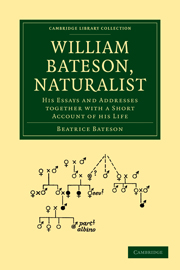Book contents
- Frontmatter
- Contents
- MEMOIR
- Hybridisation and Cross-breeding as a Method of Scientific Investigation
- Problems of Heredity as a subject for Horticultural Investigation
- An Address on Mendelian Heredity and its application to Man. Delivered before the Neurological Society, London, I. ii. 1906
- Gamete and Zygote. A Lay Discourse. The Henry Sidgwick Memorial Lecture, 1917
- Heredity and Variation in Modern Lights
- Presidential Address to the Zoological Section, British Association: Cambridge Meeting, 1904
- Presidential Address to the Agricultural Subsection, British Association: Portsmouth Meeting, 1911
- Presidential Address to the British Association, Australia: (a) Melbourne Meeting, 1914. (b) Sydney Meeting, 1914
- The Methods and Scope of Genetics. Inaugural Lecture delivered 23 October 1908. Cambridge
- Biological Fact and the Structure of Society. The Herbert Spencer Lecture, 28 February 1912. Oxford
- Science and Nationality. Presidential Address delivered at the Inaugural Meeting of the Yorkshire Science Association
- Common-sense in Racial Problems. The Galton Lecture
- Evolutionary Faith and Modern Doubts. Address to American Association for the Advancement of Science. Toronto, 1922
- Progress in Biology. An Address delivered March 12, 1924, on the occasion of the Centenary of Birkbeck College, London
- EDUCATIONAL ESSAYS
- REVIEWS
- APPENDIX
- INDEX OF PERSONS
- INDEX OF SUBJECTS
- PLATES I-III (Figs. 1-6) to Mendelian Heredity and its application to Man
Problems of Heredity as a subject for Horticultural Investigation
Published online by Cambridge University Press: 07 September 2010
- Frontmatter
- Contents
- MEMOIR
- Hybridisation and Cross-breeding as a Method of Scientific Investigation
- Problems of Heredity as a subject for Horticultural Investigation
- An Address on Mendelian Heredity and its application to Man. Delivered before the Neurological Society, London, I. ii. 1906
- Gamete and Zygote. A Lay Discourse. The Henry Sidgwick Memorial Lecture, 1917
- Heredity and Variation in Modern Lights
- Presidential Address to the Zoological Section, British Association: Cambridge Meeting, 1904
- Presidential Address to the Agricultural Subsection, British Association: Portsmouth Meeting, 1911
- Presidential Address to the British Association, Australia: (a) Melbourne Meeting, 1914. (b) Sydney Meeting, 1914
- The Methods and Scope of Genetics. Inaugural Lecture delivered 23 October 1908. Cambridge
- Biological Fact and the Structure of Society. The Herbert Spencer Lecture, 28 February 1912. Oxford
- Science and Nationality. Presidential Address delivered at the Inaugural Meeting of the Yorkshire Science Association
- Common-sense in Racial Problems. The Galton Lecture
- Evolutionary Faith and Modern Doubts. Address to American Association for the Advancement of Science. Toronto, 1922
- Progress in Biology. An Address delivered March 12, 1924, on the occasion of the Centenary of Birkbeck College, London
- EDUCATIONAL ESSAYS
- REVIEWS
- APPENDIX
- INDEX OF PERSONS
- INDEX OF SUBJECTS
- PLATES I-III (Figs. 1-6) to Mendelian Heredity and its application to Man
Summary
An exact determination of the laws of heredity will probably work more change in man's outlook on the world, and in his power over nature, than any other advance in natural knowledge that can be foreseen.
There is no doubt whatever that these laws can be determined. In comparison with the labour that has been needed for other great discoveries it is even likely that the necessary effort will be small. It is rather remarkable that while in other branches of physiology such great progress has of late been made, our knowledge of the phenomena of heredity has increased but little; though that these phenomena constitute the basis of all evolutionary science and the very central problem of natural history is admitted by all. Nor is this due to the special difficulty of such inquiries so much as to general neglect of the subject.
It is the hope of inducing others to pursue these lines of investigation that I take the problems of heredity as the subject of this lecture to the Royal Horticultural Society.
No one has better opportunities of pursuing such work than horticulturists. They are daily witnesses of the phenomena of heredity. Their success depends also largely on a knowledge of its laws, and obviously every increase in that knowledge is of direct and special importance to them.
The want of systematic study of heredity is due chiefly to misapprehension. It is supposed that such work requires a lifetime.
- Type
- Chapter
- Information
- William Bateson, NaturalistHis Essays and Addresses Together with a Short Account of His Life, pp. 171 - 180Publisher: Cambridge University PressPrint publication year: 2009First published in: 1928



